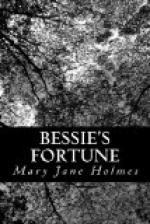He said nothing at first, but cried like a child, while Miss Betsey cried, too, a little, and blew her nose loudly, and told him not to be a fool, but to go outdoors on the plateau, where the children were, and sit there in the shade, and try to get some strength, for she wanted him very soon.
Then she went away, and he dragged himself out to the plateau, and let Neil and Robin play that he was a balky horse who would not go, notwithstanding their shouts and blows with dandelions and blades of grass, while Baby Bessie pelted him with daisies from the white cross and pansies from the border.
From that day on, Neil’s improvement was rapid, and when, on the last day of September, the Jerrolds returned to their house in Boston, they left him domesticated with Miss Betsey, and to all appearance happy and contented. He would never be very strong again, for the malaria contracted in India had undermined his constitution; but he was able to do all his aunt required of him, even to overseeing at times the hands in the cotton-mill, an office he had once spurned with contempt, and from which he undoubtedly shrank a little, although he never made a sign to that effect.
A year or more after his arrival in America he wrote to Jack Trevellian as follows:
“I hardly think you would know the once fastidious Neil McPherson, if you could see him now in a noisy cotton-mill, screaming at the top of his voice to the stupid operatives, and button-holed confidentially by the Brother Jonathans, who address him as ’Square, and speak of his aunt as the ‘old woman.’ But it is astonishing how soon one gets accustomed to things, and I really am very happy, especially when scouting the country on my beautiful bay, a present from my aunt, who gave it to me on condition that I would take care of it myself. Think of me in overalls and knit jacket, currying a horse and bedding him down, for I do all that; in fact, I do everything, even to splitting the kindlings when the chore-boy (that’s what they call him here) does not come.
“Ah, well; I have learned many things in this land of democracy, and am content; though in my heart I believe I still have a hankering after old aristocratic England, provided I could be one of the aristocrats. I suppose you




